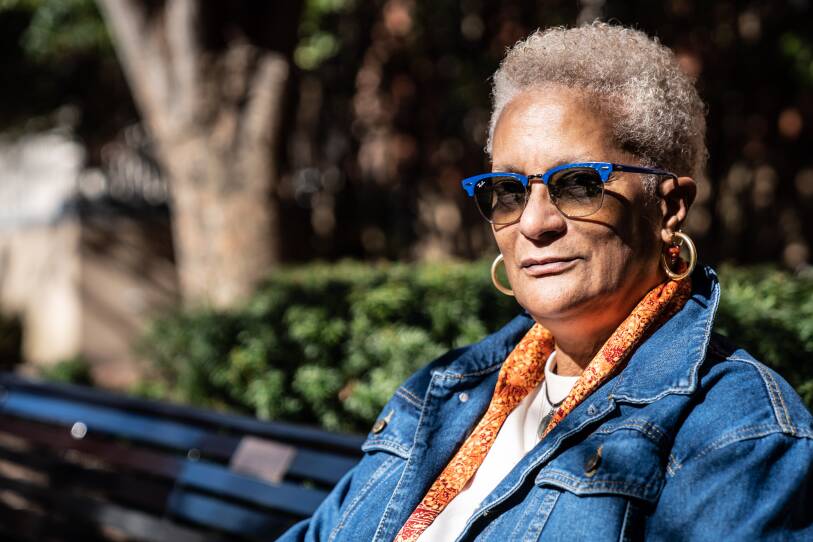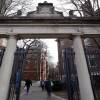Updated Feb. 17 at 4:22 p.m.
Melisande Short-Colomb was working as a chef in New Orleans when an independent genealogist sent her an email, notifying her that Jesuit priests who ran what is now Georgetown University had sold her ancestors in 1838 into southern Louisiana.
Until that moment in the summer of 2016, Melisande says she only knew from oral history that her family had once been enslaved somewhere to the north. “I had bought into the prescribed story that we'll never really know who our enslavers were, specifically,” Short-Colomb said. “When that comes out, it is both devastating and satisfying."
Then that fall, she heard Georgetown’s president announce the university would give preferential admissions treatment to descendants of the 272 enslaved Africans it sold to pay off the school’s debts. So, at 63, she applied, was accepted and went back to college to earn her degree.
With a more conservative Supreme Court poised to strike down or narrow the consideration of race in admissions, some civil rights advocates say that, as an alternative, colleges could broaden Georgetown’s approach and make being descended from any American slave a new factor in admissions. They compare such an ancestry-based approach to “legacy admissions,” in which the treatment of the children of alumni get prioritized, and say it would benefit most young people whom race-conscious admissions was originally intended to help. But critics point out that approach would leave out other minority groups who have benefited from the current practice.
Ted Shaw, director of the Center for Civil Rights at the University of North Carolina, believes many civil rights lawyers would support ancestry-based admissions for descendants of slaves.
“Affirmative action, when it started, was aimed at addressing and remedying the history of discrimination against Black Americans and trying to open up opportunities for them,” Shaw, a former director-counsel of the NAACP Legal Defense and Educational Fund, told GBH News. “It would be correct to return to the roots of these efforts.”
The original purpose of considering race in admissions was outlined back in 1965, when President Lyndon Johnson gave a commencement address at Howard University. Talking about the economic disparities between Black and white people, he made the case for race-conscious admissions as one way to remedy past discrimination.
“You do not take a person who, for years, has been hobbled by chains and liberate him, bring him up to the starting line of a race and then say, ‘You are free to compete with all the others,’ and still justly believe that you have been completely fair,” Johnson said. “It is not enough just to open the gates of opportunity. All our citizens must have the ability to walk through those gates.”
But the Supreme Court outlawed that rationale and legally enshrined another for considering race in admissions in its 1978 decision in Bakke v. California Board of Regents. The case was brought by an older white student who was denied admission to medical school at the University of California Davis, which had reserved a portion of its slots for Black applicants. The ruling banned such racial quotas.
Shaw was a young law student when he managed to find a seat inside the Supreme Court’s chambers on the day of its landmark Bakke decision. Sitting in the back of the packed courtroom, Shaw heard Justice Lewis Powell, appointed by former President Richard Nixon, read his majority opinion that said colleges could consider race as one factor, but only for the purpose of achieving student diversity.
Shaw recalled that, at the time, African Americans saw that decision as a profound loss, with Powell ruling colleges could not use “societal discrimination” as a justification for considering race.
“He got four other justices to go with him, which put a real dent into what institutions could do to remedy past discrimination,” Shaw said. “It turned Black and brown people into beneficiaries of the diversity effort, but not main players in achieving their own diversity.”
Attorney-advocate and Harvard fellow Richard Cellini wants to change that.
“Georgetown owes its very existence to slavery and enslaved people and their descendants today,” said Cellini, an alumnus and founder of the Georgetown Memory Project.
Based in Cambridge, the independent, nonprofit research institute is dedicated to identifying all of the enslaved people that Georgetown sold. So far, the project has traced more than 10,000 of their direct descendants. “They, I believe, are entitled to reparations in addition to privileged admissions preference at Georgetown,” Cellini said.
Since 2016, Georgetown told GBH News it has admitted 16 descendants. The university would not say how many have applied. During the same period, the school admitted about 1,500 legacy students descended from alumni.
Cellini characterized the small number enrolled based on their descent from Georgetown’s slaves as “a drop in the bucket.”
Besides, he added, “Admissions preference is just a leg up in the admissions process. It's not a guarantee of admission to Georgetown, and it's absolutely not a financial scholarship. It's no guarantee of financial aid.”
"Affirmative action, when it started, was aimed at addressing and remedying the history of discrimination against Black Americans and trying to open up opportunities for them."Ted Shaw, director of the Center for Civil Rights at the University of North Carolina
If the Supreme Court restricts the consideration of race in admissions, Cellini, a self-described conservative, said he would like to see Harvard and other American colleges shift their focus away from race to slave descent.
“The way forward here is to consider Black people war veterans — veterans of the war against racism, slavery and discrimination,” he said. “Simply give them the same honor and respect that the country accords to veterans, because, in a very real way, these are the people who built our colleges and built our university.”
One opponent of race-conscious admissions says such a policy would be an improvement over the status quo, both legally and morally.
“But it would have significant problems of its own,” said Ilya Somin, a law professor at George Mason University in Virginia.
Somin says ancestry-based admissions could be seen as a proxy for race that would leave out individuals who look white, Asian or Latino. Such a policy could also lead to fraud.
“If you just use self-identification, there'd be obvious incentives for fraud or deception,” he said. “It's not at all clear that we can automatically assume that anyone who is descended from a slave necessarily is a victim of discrimination or injustice.”
Somin, a libertarian, and some conservatives argue slavery ended so long ago that it's impact on the lives of descendants is uncertain. But national data show African Americans — the overwhelming majority of whom had enslaved ancestors — lag behind whites in measures of socioeconomic status like education, income and home ownership.
Iván Espinoza-Madrigal, executive director of the Lawyers for Civil Rights Boston, said he worries Latinos and other marginalized groups would be left out. He said colleges and the Supreme Court should consider the broader implications of slavery and legal segregation under Jim Crow.
“Many Americans are familiar with the really shameful and intense history of lynching, particularly in the deep South of Black men and women,” Espinoza-Madrigal said. “But they're not familiar with the lynching of Latinos, so thinking through how the legacy of slavery affects many historically disenfranchised groups, I think, is an important element of how we think about inclusion in contemporary society.”
Natasha Warikoo, a sociology professor at Tufts University, researches racial and ethnic inequality. Like Espinoza-Madrigal, she said she is concerned that substituting slave descent for race would leave out Latinos and Asian Americans.
Overall, Asian Americans are overrepresented in selective colleges, while African Americans, Latinos and Native Americans are underrepresented.

Cellini with The Georgetown Memory Project said those who would be eligible under slave descent admissions extends beyond African Americans.
“This is not a race-based preference,” he argued. “This is a recognition of the effects of slavery. Slavery didn't just affect Black people. It primarily affected Black people, but it also affected Native Americans. There were people of mixed race who were enslaved as well.”
In the early years of European settlement, some members of Native American tribes along the East Coast were enslaved before African captives were imported and, later, alongside them.
Despite Georgetown’s intentions toward descendants of its former slaves, Short-Colomb had skeptical but forward-looking reasons for accepting the school's invitation to enroll.
“Before I would send my grandchildren or nieces and nephews to Georgetown,” she said, “I needed to know what exactly Georgetown was talking about and what they were doing. Because saying something and doing something — they are not the same thing.”
Short-Colomb has decided to study history and theater, working several jobs on and off campus to cover tuition and fees. On campus, she wrote and performed a one-woman play called Here I Am.
As the descendant of enslaved people sold by Georgetown's Jesuits, her experience on campus at times has been overwhelming and disorienting, she said.
“Not only do you know your family was and is, you also get to mentally, physically and emotionally interact with the institution, families and people who enslaved and trafficked your ancestors,” Short-Colomb said.
However the Supreme Court rules, probably next year, she hopes other selective universities that benefited from the institution of slavery will follow Georgetown’s lead.
“All of the policies and laws during the Jim Crow period that were passed to disenfranchise Black people in America and legally make our lives a living hell in the United States of America, those are the laws and the policies and the institutions and the people who are responsible to correct what they have created,” she said.
Correction: An earlier version of this story mischaracterized the ideological affiliation of Ilya Somin, a libertarian.








